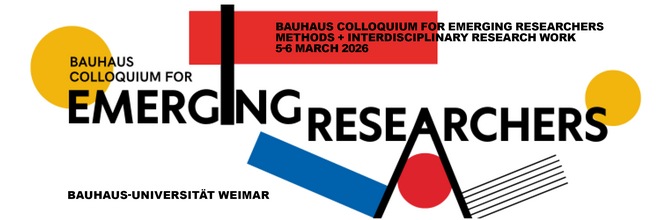Bauhaus Colloquium for Emerging Researchers 2026

Methods + Interdisciplinary Research Work
Motivation & Scope
Methods play a decisive role in research practice. They influence how questions are asked, how results are generated, and how scientific knowledge becomes verifiable, reproducible, and communicable. Consequently, methods constitute the foundation of academic research and are the subject of systematic evaluation and revision.
Simultaneously, these points serve as the primary basis for addressing scientific skepticism. By not only presenting research results but also explaining how they were obtained, they prevent misinformation and serve to legitimize and make scientific results comprehensible. From the research perspective, communicating the methods used is, alongside scientific results, one of the essential components of science transfer. How can we adapt new formats of science transfer on emerging platforms, specifically to the transfer of methods?
Each method has its own unique challenges: collecting data for empirical studies, especially when it comes to data that is difficult to obtain due to political or social instability in the regions concerned; the academic or subject-specific environment as a decisive factor in the fundamental “orientation” of certain qualitative, theoretical, or analytical approaches; and new experimental research programs with a particular focus on interdisciplinary collaboration.
Bauhaus Colloquium for Emerging Researchers offers an open platform for critical reflection on “established” methods, discussing potential expansion to understand the complex dynamics of our daily research work. An interdisciplinary collaborative approach efficiently incorporates diverse perspectives to address complex issues in today’s global context. Furthermore, interdisciplinary collaboration offers substantial benefits compared to conventional research approaches that simply compile results from separate disciplines without fostering substantive interaction during the process. Researchers from different disciplines bring different methodological tools into dialogue with each other, creating new paths for knowledge.
The following topics are intended to be addressed in the colloquium:
- How do traditional single-discipline research, knowledge transfer, and cultures influence the methodological process?
- How do methodological approaches influence specifically research processes, formats of collaboration, and knowledge transfer?
- Which external conditions—such as funding structures, institutional frameworks, or geopolitical contexts—affect the recognition, development, and dissemination of methods?
- How do disciplinary cultures influence methodological approaches?
- How can artistic, design-based, or practice-oriented approaches extend the established methodological canon?
- How does methodological transparency contribute to countering skepticism toward science and strengthening academic transfer?
- What role are methods playing in interdisciplinary collaboration?
- What influence does interdisciplinary work have on the refinement and/or modification of supposedly established methods?
Bauhaus Researchers Colloquium invites researchers from all disciplines to present their current research processes, with a particular focus on methodological approaches and interdisciplinary collaboration. By highlighting methods as the common ground, the colloquium aims to explore how different research traditions intersect and how new synergies can emerge from this in interdisciplinary collaborations.
We welcome a diverse range of research output formats that reflect both traditional academic rigor and innovative forms of knowledge dissemination. In addition to conventional papers, presentations, and posters, we encourage submissions that explore non-traditional formats such as design prototypes, installations, performances, audio-visual essays, interactive media, or other practice-based and artistic research expressions. This inclusive approach aims to expand how research is shared, understood, and engaged with, fostering an inter-/transdisciplinary exchange to think the world otherwise.
This colloquium aims to provide a platform for exchange and debate. Selected contributions will be included in the proceedings of the XV. International Bauhaus Colloquium, giving participants the opportunity to disseminate their work to a wider audience.
Why Participate?
- Engage in dialogue with fellow researchers across disciplines
- Share open questions, uncertainties, and engage in constructive dialogue
- Contribute to the discussion on methods in contemporary research
- Gain feedback and inspiration during keynotes and panel discussions
Key Dates & Submission Guidelines
- Call for Papers announcement: 16th of September 2025
- Abstract submission deadline (extended): 14th of December 2025
- max. 1 page (approx. 2.000 characters without references)
- Session submission deadline: Mid-February 2026
- 6–8 pages, including references
- Conference dates: 5th and 6th of March 2026 (KW 10)
Format & Language
- Submissions in English (alternative in German)
- Detailed guidelines will be provided upon acceptance
